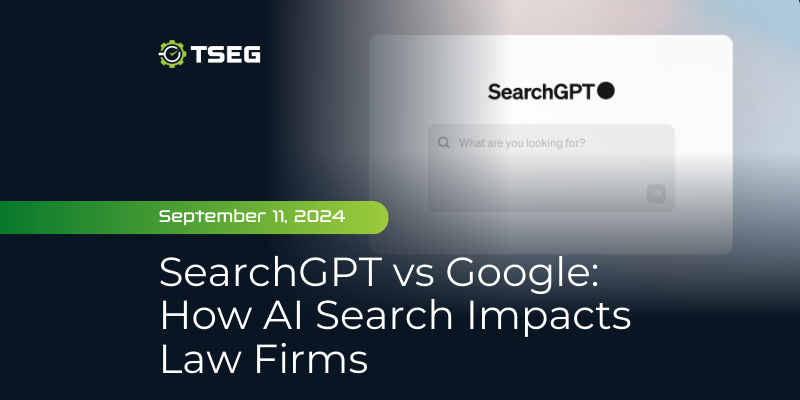SearchGPT vs Google: How AI Search Impacts Law Firms
Posted on Wednesday, September 11th, 2024 at 5:09 pm
AI Search in the Legal Industry – SearchGPT vs. Google
With AI tools like SearchGPT entering the scene, your potential clients are shifting the way they seek legal information. SearchGPT, created by OpenAI, provides concise, citation-backed answers, making it a powerful resource for users searching for quick legal advice. Unlike Google’s traditional list of links, SearchGPT offers direct, conversational responses, which can significantly change how law firms approach digital marketing.
For law firms, this development means potential clients may no longer rely on standard search results to find attorneys or answers to legal questions. Instead, clients might begin their legal research using AI-driven platforms. In this discussion, we’ll break down how SearchGPT compares to Google and what it means for law firms seeking better tools for legal research.
What is SearchGPT?
SearchGPT is an AI-powered search engine launched by OpenAI, designed to provide direct answers sourced from real-time web data. Unlike Google, which provides a series of links for users to explore, SearchGPT delivers concise summaries based on authoritative sources. For potential legal clients, this means they can quickly access relevant information about their legal issues without combing through multiple websites.
For law firms, this represents a fundamental shift. Prospective clients using SearchGPT might no longer land on a law firm’s website directly through a search engine, but instead receive summarized legal advice from AI. This new search behavior could make it harder for law firms to capture attention unless they adapt their digital marketing strategies to align with these changes.
The Pros and Cons of SearchGPT for Law Firms and Clients
PROS
- Quick Access to Legal Information: SearchGPT provides users with immediate answers to legal questions, which can streamline the research process for prospective clients. Instead of wading through a list of links, users receive concise, well-sourced information instantly.
- Authoritative Summaries: SearchGPT pulls information from reputable sources, which means clients can get accurate snapshots of legal concepts or issues without needing deep legal expertise.
- Potential for Law Firms to Be Cited: Law firms with strong, informative online content may find their information used as part of SearchGPT’s responses, increasing their visibility in AI search tools.
CONS
- Lack of Personalized Legal Advice: While SearchGPT can provide general legal information, it lacks the depth and nuance that a potential client might need when researching personal legal matters. This could lead users to rely on incomplete advice.
- Risk of Outdated or Inaccurate Information: Like other AI tools, SearchGPT may sometimes provide outdated or incorrect information (a phenomenon known as “hallucination” in AI terms) which poses a challenge for law firms if clients act on this incomplete data.
- Reduced Website Traffic: Because SearchGPT delivers direct answers, potential clients may no longer visit law firm websites, limiting firms’ opportunities to connect with users directly through traditional content.
How SearchGPT Impacts Law Firm Client Searches
SearchGPT’s ability to provide immediate answers means that prospective clients might turn to it for quick legal research, whether they’re exploring personal injury claims, family law matters, or business disputes. These users may ask SearchGPT questions like, “How much can I sue for in a car accident?” or “What are my rights during a divorce?”—bypassing the need for deeper exploration on traditional search engines.
This presents both a challenge and an opportunity for law firms. While SearchGPT may offer quick advice, it lacks the personalization and depth that clients require when deciding to hire an attorney. Law firms must now ensure their online presence is optimized not only for Google but also for AI-driven search engines, so their content can be cited as a trustworthy source in these summaries.
Below is an ChatGPT example:
How Law Firms Can Adapt Their Digital Marketing for SearchGPT
To remain visible, law firms need to rethink their SEO strategies for AI tools like SearchGPT. Unlike Google’s traditional ranking system, which prioritizes authority and relevance, SearchGPT extracts information from diverse sources to generate a response. This means firms must create content that not only ranks well on Google but is also clear, informative, and authoritative enough to be referenced by AI tools.
Here’s where TSEG’s expertise becomes essential. TSEG specializes in creating high-quality, search-optimized content that appeals to both traditional search engines and AI-driven tools. We help law firms ensure their content remains a go-to source for legal information, increasing the likelihood that their insights will be used in SearchGPT’s responses. This dual optimization approach is critical as potential clients’ search behavior develops.
Google’s Continued Relevance
While SearchGPT introduces a new way to find information, Google remains dominant for many types of searches. For law firms, Google’s ability to handle local, navigational, and transactional queries makes it indispensable. When potential clients search for a nearby lawyer or specific legal services, Google’s precision in delivering real-time results gives it a clear advantage.
Additionally, while SearchGPT can occasionally provide incorrect or outdated information, Google’s vast indexing capabilities ensure more reliable, up-to-the-minute data. Despite SearchGPT’s innovation, law firms will still need Google’s consistency and reliability for certain types of searches, making both platforms essential in their digital strategies.
TSEG’s Role
TSEG’s deep knowledge of legal digital marketing positions us to help law firms stay ahead of these changes. As search behavior shifts from traditional engines to AI-powered tools, TSEG guides firms in creating content that appeals to both formats. By creating content that works effectively for both Google’s algorithm and AI models like SearchGPT, TSEG supports firms in enhancing their online presence and improving research efficiency, ensuring they can attract potential clients no matter which search method is used. Partner with us today.

